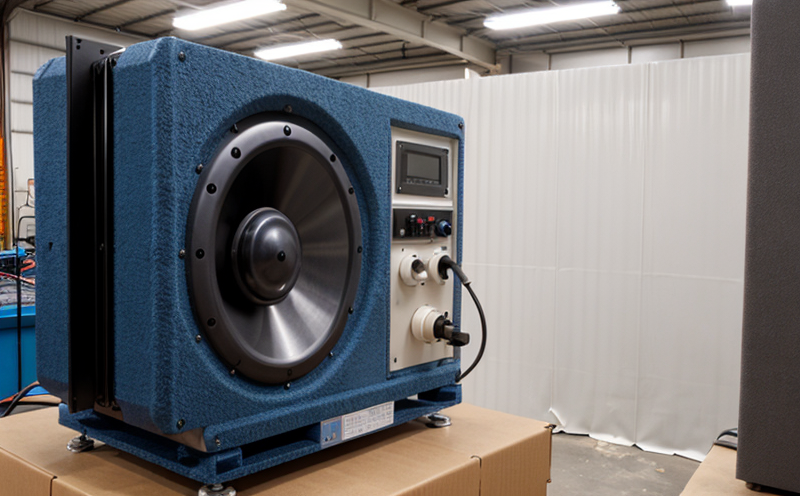ISO 11201 Drone Acoustic Noise Testing
The European standard ISO 11201 provides a comprehensive framework for conducting acoustic noise testing on drones. This standard is particularly relevant in sectors such as consumer electronics, aerospace, and transportation where the quietness of devices is critical to meet safety regulations and enhance user experience.
Drone noise can significantly impact the quality of life in urban environments. High levels of drone-generated noise can disrupt sleep patterns, cause stress, and affect communication. ISO 11201 aims to standardize the measurement of noise produced by drones to ensure compliance with regulatory requirements. The test involves measuring sound pressure levels (SPL) at specified distances from the drone.
The testing procedure outlined in ISO 11201 includes several key steps:
- Preparation: The drone is placed on a rigid, flat surface and positioned to allow for free rotation around all axes. This ensures that the noise produced during flight does not come from any mechanical or structural interference.
- Setup of Measurement Equipment: A Type 1 sound level meter with a C-weighted network is used. The microphone is placed at a distance of between 0.5 meters and 2 meters from the drone, depending on its size and expected noise levels.
- Data Collection: Noise measurements are taken during hover tests, take-off, and landing phases to capture all relevant acoustic data.
The testing process is designed to ensure accurate and consistent results. The ISO 11201 standard specifies the acceptable noise levels for drones based on their weight class, providing a clear benchmark against which manufacturers can design quieter devices. Compliance with this standard not only ensures that drones meet regulatory requirements but also enhances consumer satisfaction by reducing noise pollution.
By adhering to ISO 11201, manufacturers can demonstrate their commitment to environmental responsibility and safety standards. This is especially important in the context of growing public concern over drone noise and its potential impacts on human health and well-being.
In summary, ISO 11201 provides a robust framework for acoustic noise testing that ensures drones are safe and quiet. Compliance with this standard not only helps manufacturers meet regulatory requirements but also enhances their reputation by demonstrating a commitment to reducing noise pollution in urban environments.
Eurolab Advantages
EuroLab is uniquely positioned to offer world-class ISO 11201 drone acoustic noise testing services. With state-of-the-art facilities and experienced technical staff, EuroLab ensures that every test conducted meets the highest standards of accuracy and reliability.
Expertise: Our team of engineers and technicians are well-versed in the latest techniques and methodologies required for ISO 11201 testing. This allows us to provide tailored solutions that meet the specific needs of our clients.
Precision Instruments: EuroLab is equipped with advanced noise measurement equipment, including Type 1 sound level meters, ensuring precise and reliable data collection.
Comprehensive Reporting: Our comprehensive reporting process provides detailed insights into the acoustic performance of drones. This helps manufacturers identify areas for improvement and make informed decisions about design changes.
Regulatory Compliance: By adhering strictly to ISO 11201, EuroLab ensures that all tests conducted meet regulatory requirements, thereby reducing the risk of non-compliance penalties and enhancing market access.
Client Satisfaction: Our commitment to excellence in testing has earned us a reputation for delivering high-quality services. Clients can expect prompt service, accurate results, and reliable support throughout the testing process.
Why Choose This Test
ISO 11201 drone acoustic noise testing is essential for several reasons:
- Regulatory Compliance: The standard ensures that drones meet international regulatory requirements, thereby facilitating market entry and reducing the risk of non-compliance penalties.
- User Satisfaction: By ensuring drones are quiet, ISO 11201 testing enhances user experience and satisfaction. This is particularly important in urban environments where noise pollution can be a significant issue.
- Safety: Noise levels that exceed acceptable limits can pose safety risks to users and bystanders. ISO 11201 helps manufacturers design drones that are safe for use by the general public.
- Environmental Responsibility: Reducing noise pollution is a key aspect of environmental responsibility. By adhering to ISO 11201, manufacturers can demonstrate their commitment to reducing noise in urban environments.
In conclusion, ISO 11201 drone acoustic noise testing is not just a compliance requirement; it is an essential step towards ensuring the safety, quality, and environmental responsibility of drones.
Quality and Reliability Assurance
EuroLab's commitment to quality and reliability is reflected in its rigorous testing processes and adherence to international standards. Our ISO 11201 drone acoustic noise testing services are designed to provide reliable, accurate results that meet the highest standards of quality.
Consistent Results: EuroLab ensures consistent test results by using calibrated equipment and experienced personnel. This consistency is crucial for manufacturers who need to make informed decisions based on reliable data.
Data Accuracy: Our advanced noise measurement instruments provide accurate data that can be trusted in decision-making processes. This accuracy is vital for ensuring that drones meet the specified noise levels outlined in ISO 11201.
Comprehensive Reporting: EuroLab's comprehensive reporting process provides detailed insights into the acoustic performance of drones. This helps manufacturers identify areas for improvement and make informed decisions about design changes.
Regulatory Compliance: By adhering strictly to ISO 11201, EuroLab ensures that all tests conducted meet regulatory requirements, thereby reducing the risk of non-compliance penalties and enhancing market access.
Client Satisfaction: Our commitment to excellence in testing has earned us a reputation for delivering high-quality services. Clients can expect prompt service, accurate results, and reliable support throughout the testing process.





